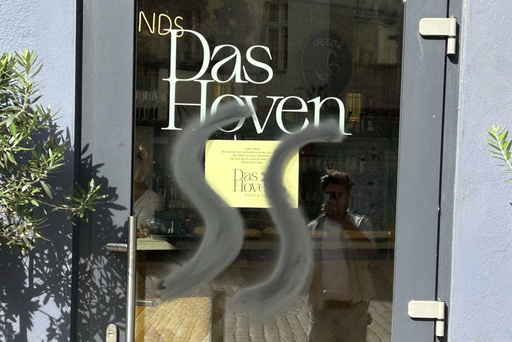In a bustling part of Berlin, the Das Hoven cafe displays a bright neon sign declaring “QUEER AND FRIENDS.”
This sign aims to mark the establishment as a haven for the LGBTQ+ community. However, it has also attracted a wave of hatred and homophobic aggression towards the place. Danjel Zarte, the cafe owner, has revealed that over the last year and a half, there are about 45 ongoing criminal cases associated with the venue. These involve both verbal and physical assaults directed at patrons and staff, window damage, and defacement with feces and Nazi symbols. There was even a chilling incident where someone confronted the cafe wielding a gun. “An act of terror,” Zarte lamented, sharing how the stress leads to panic attacks for him, fearing what he might discover on his phone each morning.
There is a disturbing rise in attacks against LGBTQ+ individuals and their safe spaces throughout Germany, particularly in Berlin, a city long known for its open and accepting atmosphere. According to data from the Association of Counseling Centers for Victims of Right-Wing, Racist and Antisemitic Violence, last year witnessed a 40% surge in violence aimed at LGBTQ+ individuals in numerous federal states compared to 2023. However, activists believe these figures only scratch the surface, as many victims are too afraid to report such incidents. This heightened hostility is partly attributed to the resurgence of far-right ideologies across Europe, notably within Germany, where the Alternative for Germany party made notable advances in the February elections.
Judith Porath, managing director of the aforementioned association, explains that animosity towards LGBTQ+ communities often energizes right-wing extremists. Experts are witnessing a swell in neo-Nazi gatherings and acts of violence, predominantly among young males. Bastian Finke from MANEO, an organization monitoring anti-gay violence in Berlin, notes that openly queer individuals face substantial risks just for being themselves, facing daily threats of assault, verbal abuse, and public humiliation.
The tension was palpable during Berlin’s recent Christopher Street Day parade. This annual Pride event serves to remember the Stonewall rebellion of 1969 in New York City, an uprising born from resistance to a police raid at the Stonewall Inn, a well-known gay bar. Thomas Hoffmann, an executive board member of the event, remarked on the tense atmosphere at this year’s parade, “People are afraid; they feel unsettled.” Yet, the gathering of hundreds of thousands, marching to the rhythm of techno music towards the Brandenburg Gate, sent a powerful message advocating for equality. Hoffmann emphasized the significance of these moments, even as the fight to secure explicit constitutional protections against discrimination based on gender identity remains a distant political aspiration.
For Zarte, the perpetual anxiety tied to hate crimes and the political climate only eases momentarily during events like the Christopher Street Day parade. “It is deeply moving to feel fully accepted once a year,” he expressed with emotion.


